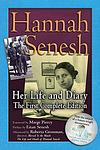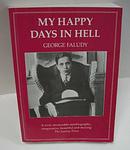The Greatest Hungarian, Dutch "Nonfiction" Books of All Time
Click to learn how this list is calculated.
This list represents a comprehensive and trusted collection of the greatest books. Developed through a specialized algorithm, it brings together 300 'best of' book lists to form a definitive guide to the world's most acclaimed books. For those interested in how these books are chosen, additional details can be found on the rankings page.
Genres
Countries
Date Range
Reading Statistics
Click the button below to see how many of these books you've read!
Download
If you're interested in downloading this list as a CSV file for use in a spreadsheet application, you can easily do so by clicking the button below. Please note that to ensure a manageable file size and faster download, the CSV will include details for only the first 500 books.
Download-
1. The Diary of a Young Girl by Anne Frank
This book is a real-life account of a young Jewish girl hiding from the Nazis during World War II, written in diary format. The girl and her family are forced to live in a secret annex in Amsterdam for two years, during which she writes about her experiences, fears, dreams, and the onset of adolescence. The diary provides a poignant and deeply personal insight into the horrors of the Holocaust, making it a powerful testament to the human spirit.
-
2. The Praise of Folly by Erasmus
This satirical work is a critique of the practices of the Church and the wider social behavior of the time. Narrated by Folly, the female personification of foolishness, the book humorously criticizes various aspects of society such as superstitious religious practices, scholarly pedantry, and the excesses of the upper classes. The book is a bold critique of its time, using humor and irony to expose the follies of its society.
-
3. The Waning of the Middle Ages by Johan Huizinga
"The Waning of the Middle Ages" is a historical analysis of the cultural life of the late Middle Ages, particularly in France and the Low Countries, during the 14th and 15th centuries. It delves into the period's modes of thought, forms of expression, religious beliefs, and social norms. The book argues that the era was characterized by a highly stylized and overwrought civilization, marked by an excessive emphasis on chivalry and courtly love, a religious mindset dominated by the fear of death and the afterlife, and a cultural milieu that was both highly imaginative and deeply pessimistic.
-
4. Ethics by Baruch de Spinoza
"Ethics" is a philosophical work that explores complex ideas about God, the universe, human emotions, and the path to enlightenment. The book outlines a metaphysical, epistemological, and ethical system in which God and the universe are one and the same, rejecting traditional notions of a personal deity and asserting that understanding the natural world leads to peace of mind and happiness. The work delves into the nature of the human mind and its emotions, advocating for the pursuit of reason and knowledge to achieve a calm, enlightened state.
-
5. Hannah Senesh by Hannah Senesh
This book is a collection of the diaries, letters, and poems of a young Jewish woman who emigrated from Hungary to Palestine in the 1930s, driven by her Zionist beliefs. She joined the Haganah and later volunteered for a daring military operation to parachute into Nazi-occupied Europe during World War II, with the aim of aiding Allied forces and rescuing Hungarian Jews from the Holocaust. Her writings reflect her courage, literary talent, and the depth of her commitment to her cause. Tragically captured, tortured, and eventually executed by the Nazis, she became an enduring symbol of bravery and sacrifice in the face of tyranny.
-
6. The Letters Of Vincent Van Gogh by Vincent van Gogh
"The Letters of Vincent van Gogh" is a compilation of correspondence that provides a deep and personal insight into the mind of one of the world's most famous and influential painters. Through these letters, primarily written to his brother Theo, the reader gains an intimate understanding of Van Gogh's thoughts on art, his emotional struggles, his aspirations, and the profound relationships he maintained throughout his turbulent life. The collection not only sheds light on his creative process but also reveals his reflections on existence, his financial difficulties, and his relentless pursuit of his artistic vision, offering a poignant look at his world from his own perspective.
-
7. Homo Ludens: A Study of the Play-Element in Culture by Johan Huizinga
"Homo Ludens: A Study of the Play-Element in Culture" is a comprehensive exploration of the significance of play in human culture. The author argues that play is not just a childhood activity but a crucial component of societal development and cultural evolution. He delves into various aspects of culture such as law, war, knowledge, poetry, and philosophy, demonstrating how each has been influenced by elements of play. The author's thesis is that understanding the role of play in our culture is essential to understanding human nature itself.
-
8. A Journey Round My Skull by Frigyes Karinthy
"A Journey Round My Skull" is a deeply personal narrative that takes the reader through the author's own experiences with a brain tumor and the subsequent neurosurgery. Written with a blend of humor, introspection, and medical detail, the book explores the author's changing perceptions and emotions as he confronts his mortality and the intricacies of his own mind. It is a pioneering work in the genre of medical memoirs, offering a unique window into the psychological and physical journey of a patient in the early 20th century, as well as the evolving field of neurosurgery.
-
9. Bezzeg Az én Időmben by Klára Fehér
"Bezzeg Az én Időmben" is a reflective work that delves into the generational differences and societal changes in Hungary, offering a nostalgic look at the past through the lens of personal anecdotes and cultural observations. The book contrasts contemporary life with the experiences of previous generations, exploring themes of family, education, and social norms. It serves as a commentary on the evolution of Hungarian society, inviting readers to consider the implications of progress and the value of tradition in a rapidly changing world.
-
10. The Confessions Of A Haut Bourgeois by Sándor Márai
"The Confessions of a Haut Bourgeois" is a memoir that delves into the life and reflections of a man born into the Hungarian upper middle class at the turn of the 20th century. The narrative explores the author's formative years, education, and experiences that shaped his worldview, set against the backdrop of a fading Austro-Hungarian Empire and the tumultuous changes sweeping through Europe. It is a poignant examination of the cultural and social mores of the time, as well as a personal reckoning with the loss of the author's own privileged world and the search for identity in a society undergoing profound transformation.
-
11. My Happy Days In Hell by György Faludy
The book is an autobiographical account of a Hungarian poet's life during the mid-20th century, chronicling his experiences from his carefree youth through the rise of fascism and his subsequent imprisonment in a brutal labor camp. It is a tale of intellectual passion, political upheaval, and the resilience of the human spirit in the face of totalitarianism. The narrative captures the author's journey through a Europe ravaged by war and political strife, his encounters with notable literary figures, and his unyielding commitment to his beliefs and to poetry, even as he endures the hardships and absurdities of a communist regime.
-
12. I Have Lived a Thousand Years by Livia Bitton-Jackson
This memoir tells the harrowing story of a 13-year-old Jewish girl's survival during the Holocaust. The narrative follows her life from her quiet existence in Hungary through the horrors of Auschwitz and other concentration camps, and finally to her liberation and the struggle to rebuild her life in the aftermath of such trauma. The memoir is a powerful testament to human resilience and the will to survive against all odds.
-
13. Infidel by Ayaan Hirsi Ali
The book is a powerful memoir of a woman who was born into a traditional Muslim family in Somalia. She recounts her experiences of growing up in a strict Islamic culture, female genital mutilation, civil war, fleeing to the Netherlands as a refugee, and her eventual rejection of her faith after witnessing its violent and oppressive nature. The book also follows her journey into politics and advocacy for women's rights and her efforts to reform Islam. It's a tale of courage, resilience, and the quest for freedom and truth.
-
14. Darwin's Dreampond by Tijs Goldschmidt
The book explores the dramatic impact of human intervention on the ecosystems of Lake Victoria, focusing particularly on the cichlid fish species. The author, an evolutionary biologist, recounts his fieldwork in the 1980s, observing firsthand the ecological and evolutionary changes resulting from the introduction of the Nile perch, a predatory fish. This event led to the extinction of numerous cichlid species, which had been remarkably diverse and a key example of adaptive radiation. The narrative combines scientific observation with reflections on the broader implications of biodiversity loss and the complex relationship between humans and the natural world.
Reading Statistics
Click the button below to see how many of these books you've read!
Download
If you're interested in downloading this list as a CSV file for use in a spreadsheet application, you can easily do so by clicking the button below. Please note that to ensure a manageable file size and faster download, the CSV will include details for only the first 500 books.
Download










